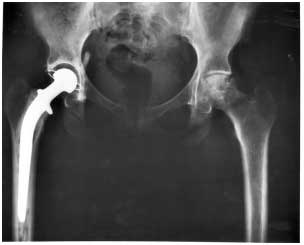|
Metal Hip Implants Could Have New Testing Standards
 The
possibility of new testing standards for metal-on-metal hip replacement systems
could have implications for plastic implants. The
possibility of new testing standards for metal-on-metal hip replacement systems
could have implications for plastic implants.
Reuters reported on March 29 that the Food and Drug
Administration (FDA), because of increasing concerns about the safety of the
metal systems, will sponsor an advisory panel on June 27-28 to gather input from
scientists, researchers, patients, and medical practitioners. The meeting will
help regulators decide whether to impose new testing standards that would be met
before a device could be sold in the United States.
“We are asking outside scientific and medical experts to
discuss recent information on these devices so that the agency can continue to
make reliable safety recommendations to patients and their health care
providers,” William Maisel, M.D., M.P.H., deputy director of science at FDA’s
Center for Devices and Radiological Health, said in an FDA statement.
An FDA website says that there are currently four device
options for total hip replacement in the United States: 1) metal ball with a
polyethylene socket; 2) a ceramic ball with a polyethylene socket; 3)
metal-on-metal; and 4) a ceramic ball with a ceramic socket.
About 270,000 hip replacements occur in the United States
each year, Reuters reports. Evidence is growing that all-metal hip implants fail
at higher rates than systems that use other materials. The wire service further
reports:
A recent study from the National Joint Registry of England
and Wales showed that about 6 percent of people with the metal-on-metal variety
needed additional surgery to replace or repair them after five years, compared
with 1.7 to 2.3 percent of people who had ceramic or plastic systems.
As part of its announcement of the June meeting, FDA noted
that there are differences between the U.K. and U.S. regulatory systems and,
therefore, the U.K. data may not be directly applicable to the experience in the
United States. For example, some of these medical devices in the United Kingdom
are not available in the Unites States. Still, the FDA wants to gather
additional information about adverse events in people with metal-on-metal hip
implants, it said.
Meanwhile, Bloomberg’s Trista Kelley reported on April 3 that
British regulators urged surgeons to stop using certain metal hip devices
because of “unacceptably high” rates of followup operations. Four years after
having hip placement surgery with the devices, 10.7% of the patients required a
second operation.
Kelley quotes Tom Jones, an analyst at Berenberg Bank in
London, who wrote to clients:
While this further action will not help the metal-on-metal
product class, the damage to the industry in terms of ongoing sales has, in our
view, largely already been done. The concerns about metal-on-metal generally
came to the forefront of surgeon thinking over two years ago.
The FDA announcement came one day after Consumer Reports
urged FDA to overhaul its oversight of medical devices. FDA’s 501(k) approval
system for approving medical devices also has been coming under fire.
Source: “FDA Seeks More Advice on Metal Hip Implants,”
Reuters, 3/29/12
Source: “U.K. Agency Urges Ban on Metal Hip Implant
Combination,” Bloomberg, 4/3/12
Image of hip replacement via Wikimedia Commons, used under Fair Use:
Reporting.
http://www.polymersolutions.com/blog/metal-hip-implants-could-have-new-testing-standards/ |
